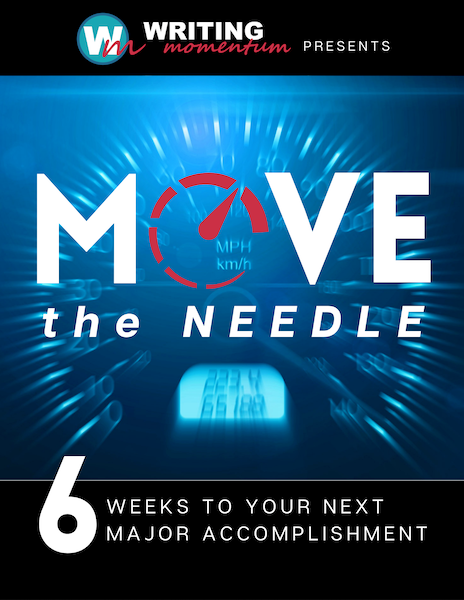Episode 71
The Dark Side of Writing: 3 Fears That Haunt Every Writer
There’s a dark side to writing: Fears that we all face as authors, writers and creators. In this episode of the Writing Momentum podcast, Chris and Gena talk about the first three fears writers face: Writer’s Block, Rejection, and Failure. Join us and discover how to overcome these fears and get your writing done!
LINKS:
- Liz Wilcox's Email Marketing Membership: Email Marketing Membership
- Get your FREE Move the Needle goal-setting for authors ebook at https://www.writingmomentum.com
- Write with us! Join Chris, Gena, and Rene each Wednesday at noon Central and let's get our writing DONE! https://www.writingmoments.com
Transcript
Hello and welcome to the Writing Momentum Podcast.
Speaker:I'm Christopher Maselli, and I'm here with my wife Gena.
Speaker:Hi there.
Speaker:Hey, how you doing Gena?
Speaker:I'm doing well.
Speaker:I'm doing well.
Speaker:Are you scared at all?
Speaker:We're talking about these tough subjects.
Speaker:This is, we're calling it like the dark side of writing.
Speaker:And I think that, it's something we need to cover.
Speaker:It's something we need to talk about because it, I do not know a writer who
Speaker:doesn't struggle with at least one or two fears related to their writing.
Speaker:And probably more than that.
Speaker:In fact, when we were putting this together, we came up with 10 different
Speaker:fears that many of us face as writers.
Speaker:You may not face them all at once, hopefully, certainly
Speaker:not all at the same time.
Speaker:But certainly over your writing career, you will run into these
Speaker:kinds of fears, time and again.
Speaker:And as you do, you want to know, first of all, you need
Speaker:to know that, this is common.
Speaker:You've chosen to be a writer and author, and in doing so, there are some challenges
Speaker:that you will face along the way.
Speaker:And we're here to tell you, you were not alone, that this is very
Speaker:common and that these are the kind of fears that you can overcome.
Speaker:And second, that's the second thing is that, hey, you can overcome all of these.
Speaker:None of these have to keep you stuck.
Speaker:And if you feel stuck by one of them, then please just know
Speaker:again, you're not in it alone.
Speaker:And hopefully we can give you some tidbits of advice that could
Speaker:help you take that next step.
Speaker:And I think that's the thing with fear is I think fear really grows and can really
Speaker:get a choke hold on any of us when it's left in the dark, when it's left unspoken.
Speaker:When you feel like you're the only one who feels this way.
Speaker:When you feel that you are the oddball.
Speaker:And you, there's just something wrong with you because if you were more
Speaker:secure or stronger or fill in the blank then somehow it wouldn't affect you.
Speaker:And that's just not true.
Speaker:And that's, I think of it like the darkness that you shine the light on it.
Speaker:You shine the light on it, it loses its power.
Speaker:And that's what we wanna do today.
Speaker:We wanna shine the light on some of these things.
Speaker:Hopefully you will listen to some of these, cuz this is actually gonna be a
Speaker:three part series we're gonna do on the fears, the common fears that writers face.
Speaker:So please come back and my hope is that you would look at those and as
Speaker:we're talking you might say, yeah, that's something I've dealt with.
Speaker:And Wow, I'm not alone.
Speaker:I'm not weird.
Speaker:I'm not, there's nothing wrong with me.
Speaker:And that by doing that, maybe it'll give you that strength to, to keep going.
Speaker:That's right.
Speaker:And you are not, again, you are not alone.
Speaker:Don't feel isolated if you start to feel isolated.
Speaker:And that's a good idea that maybe you're being subject to one of these fears
Speaker:and that hey, it's time to overcome it.
Speaker:Yep.
Speaker:So let's look at the first one.
Speaker:The first one we have talked about before.
Speaker:In fact, we talked about this fear.
Speaker:This was episode two of the Writing Momentum podcast, which is writer's block.
Speaker:So many authors have this fear of being unable to write or create
Speaker:anything meaningful or good enough, and they get trapped in that.
Speaker:That feeling of, oh, I can't do this.
Speaker:And they sit down, they think they wanna write and just like nothing comes out.
Speaker:And it, I used to say there's no such thing as writer's block because the idea
Speaker:being, not that it doesn't really exist, cuz certainly we can all feel stuck,
Speaker:but that you can always break out of it.
Speaker:And I still believe that you can always break out of writer's block
Speaker:and a lot of times what it takes is just sitting down and writing.
Speaker:Even when you don't feel like it, even if the thing you're trying to
Speaker:write doesn't come out, that's okay.
Speaker:There have been times when I've been writing like a novel for young
Speaker:adults and I know something needs to happen in the next chapter and I'm
Speaker:stuck and I can't get any further.
Speaker:And then what I'll do is I'll just start journaling for my day and I'll just
Speaker:start writing, or I'll start writing a short story about something else.
Speaker:Or I might even write a marketing piece for a website, right?
Speaker:Something that's just different.
Speaker:And in doing that, it starts getting that muscle loosening up and it starts breaking
Speaker:that fear off and you start realizing, hey, I can do this, and eventually
Speaker:that feeling of inspiration comes back.
Speaker:But, don't wait for the inspiration.
Speaker:Go ahead and put in the perspiration and get writing to break that writer's block.
Speaker:Yes.
Speaker:I would also add to that, that, Chris and I talk a lot about how writing does
Speaker:not have to be a solitary endeavor.
Speaker:That it's something you can do with people.
Speaker:Now, clearly what we're not saying that you try to collaborate on a project
Speaker:you may or may not choose to do that.
Speaker:That's not what we're talking about.
Speaker:But writing in itself, the writing life is, it's got its own
Speaker:unique what it ebbs and flows.
Speaker:It's got its unique things to it.
Speaker:The unique emotions that you're feeling, the unique projects that you're
Speaker:dealing with, the unique challenges that you're having to overcome.
Speaker:And if you've got a solid group of people who understand that, that's
Speaker:just gonna be a beautiful thing to help you break through these, and
Speaker:I will honestly be pointing back to that throughout this entire series.
Speaker:Find yourself some writers that can help you with this.
Speaker:If you don't know, we've got Writing Moments.
Speaker:We meet once a week on Wednesday mornings.
Speaker:You can go to writingmoments.com to find out more about that, but we meet
Speaker:together, we do co-writing and we start with a little bit of teaching.
Speaker:But I think one of the things that has really come out of that group
Speaker:is there is a comradery that is being built there with the writers.
Speaker:Where we are celebrating each other's successes and people are feeling that
Speaker:they can come and bring questions to the group to say what about this?
Speaker:But even beyond that, there are writers groups in your local
Speaker:areas that you can start with.
Speaker:You may start it yourself.
Speaker:You may, there may be one that's already there, but there may be one
Speaker:that you just start with yourself with just two or three friends in the area.
Speaker:You sit at a coffee shop and you talk about different things, and I think
Speaker:sometimes also when you're talking about writer's block, just by brainstorming.
Speaker:Now, I will tell you, you start to brainstorm with a, you've got something
Speaker:going on, some project that you're working with, and you start to brainstorm.
Speaker:You may not agree with the ideas that the other people are sharing
Speaker:with you, but that's not the point.
Speaker:The point is, like Chris said, you get those juices flowing.
Speaker:Yeah and that's the whole thing with meeting together, and that's the reason
Speaker:that you'd want to meet in a writer's group is because just that act of getting
Speaker:up and sitting in a different place or sitting at your computer, but turning
Speaker:on the webcam and writing together, that tends to break writer's block because
Speaker:you're in that you have that positive peer pressure that gets you writing.
Speaker:All right.
Speaker:The next one is what?
Speaker:Gena.
Speaker:Oh, this is a big one.
Speaker:This is the big one, guys.
Speaker:Rejection.
Speaker:I do not know that you can, the only way you can get away from
Speaker:rejection in the writing world is if nobody ever sees what you write.
Speaker:Yeah, rejection can come when you submit your article to
Speaker:an editor or an agent, right?
Speaker:It can come when you get negative feedback, right?
Speaker:If you're got your book on Amazon and all of a sudden someone
Speaker:gives you a one star, right?
Speaker:It can come just from not being published, from feeling like, oh, I don't have
Speaker:anything that's actually out there.
Speaker:That rejection, it can often stop writers in their path of writing.
Speaker:It can make them suddenly just feel like, Hey, what I've got just isn't good enough.
Speaker:It's very easy to go down that road.
Speaker:This is probably, other than a writer's block, one of the most common types of
Speaker:fear that writers face, and you know what the truth is, it's just part of the job.
Speaker:Rejection is part of it.
Speaker:You have to know it is going to happen, and you have to ask yourself if you
Speaker:can develop a skin that's thick enough to make it through that rejection.
Speaker:Because if you can take a manuscript that gets rejected and just say, you know what?
Speaker:I'm gonna send it out again.
Speaker:I got rejected.
Speaker:That publisher didn't like it, but I'm gonna send it out again.
Speaker:Then you can be one of those stories, like you've heard about some of the
Speaker:very popular books that are out today that were rejected 20, 30, 40 times.
Speaker:Or over a hundred.
Speaker:Or over a hundred until someone finally got it.
Speaker:Right?
Speaker:And then they weren't rejected, they were accepted.
Speaker:And so sometimes that's just the way it is.
Speaker:And I think it's good to go into the writing life knowing
Speaker:that can just be part of it.
Speaker:Because then you'll know when you get rejected that, oh,
Speaker:hey, I got a rejection down.
Speaker:That's one step closer to getting accepted.
Speaker:Yes I think you're right.
Speaker:I think.
Speaker:Changing, shifting your focus a little bit, shifting your mindset with that
Speaker:and thinking, I'm gonna send this out.
Speaker:I'm sending it out for the first time, or I'm sending it out for the 10th time.
Speaker:Or whatever.
Speaker:I'm gonna send it out.
Speaker:I believe it's really good.
Speaker:I've gotten feedback from other people that it's really good, but I know
Speaker:that I'm gonna send this out maybe 10, 20, 30 times to different places, and
Speaker:most of them are not gonna want it.
Speaker:That's just the truth of it.
Speaker:Most of the people are not gonna want it.
Speaker:Now here's the thing that you need to keep in mind though when you're
Speaker:thinking about that, is that each of these publishing houses, magazines,
Speaker:easings, whatever, that you're writing for, they all have unique voices.
Speaker:They have unique audiences, they have unique readership and just who, where
Speaker:they're going, what they're trying to do, where they're focus is in the future.
Speaker:There's so many elements that you are not privy to.
Speaker:Now, some of that you can do your own research on.
Speaker:We have talked before, you need to do your due diligence before you submit someplace.
Speaker:Don't submit something academic to Harlequin Romance.
Speaker:Don't do this wild, just throw everything at the wall and
Speaker:hopefully somebody takes something.
Speaker:If you're writing science fiction, submit to the places that accept science fiction.
Speaker:So you wanna do your due diligence to know where you're submitting it.
Speaker:But beyond that, recognize that writing is an art form, and there are going to be
Speaker:people that are going to understand what you're trying to say, and there are gonna
Speaker:be people that either don't understand it or it's just not their cup of tea.
Speaker:And that's okay.
Speaker:Yeah, and that's where like a lot of the Amazon reviews and
Speaker:that sort of thing come in.
Speaker:It's better just not to read them, honestly.
Speaker:They don't do much for your ego and they can certainly just make you feel
Speaker:horrible if people don't like it.
Speaker:And the truth is, all you have to do is look, think of your favorite movie and
Speaker:look up the Rotten Tomato scores for it.
Speaker:And generally you're gonna find that there are a bunch of people both on the critic
Speaker:side and on the consumer side that just don't jive with that particular movie.
Speaker:And that doesn't mean that it's a bad movie, it just means that to
Speaker:those people, they didn't connect.
Speaker:And everyone, of course, has a voice today.
Speaker:So it can be difficult because everyone's gonna say something.
Speaker:But don't let that make you feel rejected.
Speaker:And the other thing I would just add with that is just to keep going.
Speaker:The more you submit, honestly, the more rejection you receive on that.
Speaker:I think the thicker your skin gets for that, don't you think?
Speaker:That's right?
Speaker:Yeah, absolutely.
Speaker:And the last fear I think we should talk about today is the fear of failure.
Speaker:A lot of us can run into this fear of, oh man, if I.
Speaker:It's almost, I think a subconscious fear where we think if we finish the
Speaker:book and it doesn't do well, or people don't like it or doesn't get the
Speaker:message across, that will have failed.
Speaker:And so it's very easy to then not finish the book, right?
Speaker:We just keep finding things that we need to edit in it, keep finding
Speaker:things we need to change, and instead.
Speaker:You know what?
Speaker:Just say it's good enough.
Speaker:I know it's good enough at this point, I'm gonna put it out there.
Speaker:And you know what?
Speaker:If you get your message out there, you're not failing.
Speaker:Now, you may not connect with as many people as you wanted.
Speaker:It may not work out exactly the way you wanted, but that's where
Speaker:you just get up and start again.
Speaker:You say, okay, that one's done.
Speaker:I'm going on to the next one.
Speaker:And I think Gena and I can both attest to the fact that over, we've been
Speaker:doing this collectively for dozens and dozens of years, decades, and
Speaker:we have had many things that we have failed on, and we've had many things
Speaker:that we've had success on, and you just have to know that for everything
Speaker:you fail with, you're gonna have probably a whole handful of successes.
Speaker:It's just that sometimes those failures scream louder
Speaker:than the success does, right?
Speaker:You get that failure and it can stop you in your tracks.
Speaker:You get a success and you're kinda like, okay, good.
Speaker:I'm going to the next thing and not even realize that you haven't
Speaker:taken time to celebrate it.
Speaker:And yet we celebrate the failures, in a negative way.
Speaker:And that's exactly the opposite.
Speaker:We should do it the opposite way around.
Speaker:We should be celebrating our successes and just ignoring the
Speaker:failures and going to the next thing.
Speaker:And here's, I think, something that I have noticed along the way is that
Speaker:you get into this, Chris has said that we've been in this a long time.
Speaker:The things that you will look back on as the writer, that you
Speaker:will say, man, I am proud of that.
Speaker:Are not necessarily the things that sold the most or had the most readership.
Speaker:For sure.
Speaker:There are going to be some of those projects that you're just going to love.
Speaker:And you're going to know that they're really good.
Speaker:Yeah.
Speaker:And there's heart in them and they're just really powerful.
Speaker:And so it's not gonna be the thing that necessarily is, it's not, when
Speaker:that happens, it's not gonna matter.
Speaker:How much other people are necessarily loving it, it's
Speaker:gonna be meaningful for you.
Speaker:Yeah, that's exactly right.
Speaker:And that's what's important.
Speaker:A lot of times when you talk to authors you'll say, wow, you've got so many
Speaker:books out, which one's your favorite?
Speaker:Often, their favorite is one that's rather obscure because it meant
Speaker:the most to them, not because they had the most commercial success.
Speaker:And just know that's the way it is sometimes.
Speaker:And again, celebrate the successes, not the failures.
Speaker:And keep going.
Speaker:With all of these, you just keep going.
Speaker:You keep writing.
Speaker:If you're a writer, then you know that you've got something
Speaker:in you and you've got a write.
Speaker:So just keep going.
Speaker:Exactly.
Speaker:Don't stop.
Speaker:Hey, those are three fears that haunt every writer.
Speaker:We're gonna look at three more next week and three or four more the week after
Speaker:that until we cover every one of them.
Speaker:We'd love to hear what's one maybe that you struggled with or
Speaker:that we haven't thought of and maybe we can share some of those.
Speaker:We won't share your name but maybe we can share some of those and help other people.
Speaker:And if you enjoyed this podcast, hey, will you rate it and review it
Speaker:and subscribe to it and share it?
Speaker:Because by doing those things, it helps other people find this podcast.
Speaker:It helps them overcome these fears too.
Speaker:Yes.
Speaker:All right.
Speaker:Remember, you are not in this alone because together what Gena?
Speaker:We have writing momentum.





